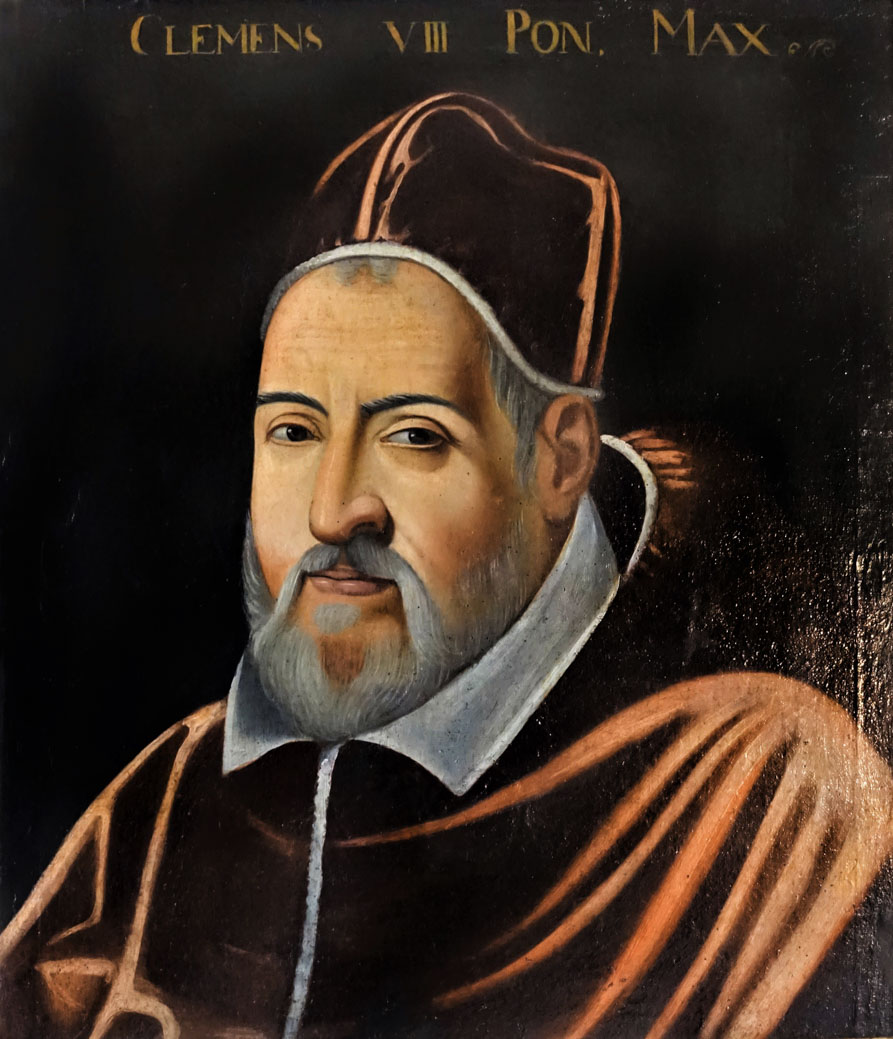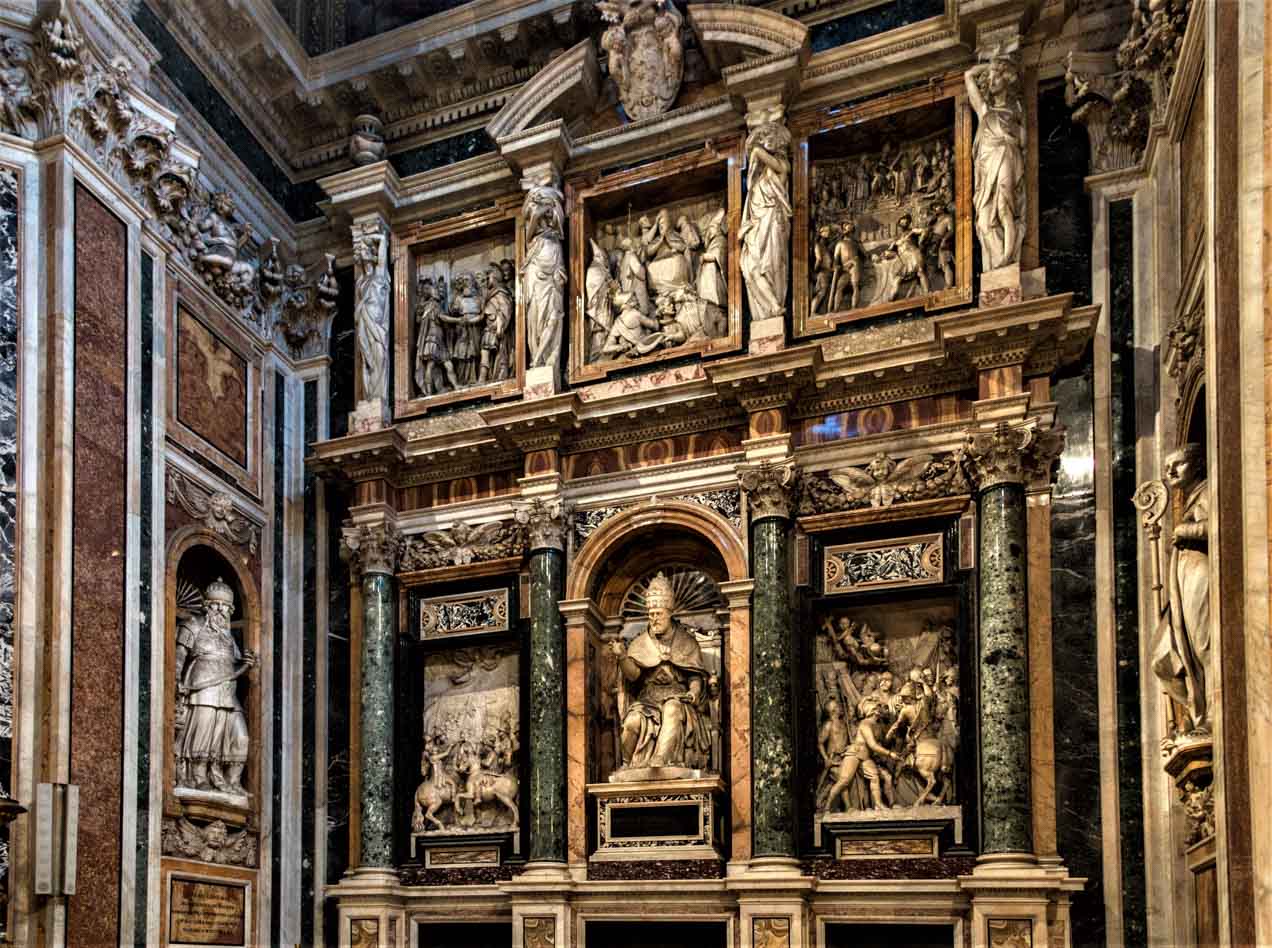
POSTACIE Popes and their associates
Pope Clement VIII (1536–1605) – an enemy of nudity, a pious and kind despot

The pope exhibited great generosity to the poor and the needy, while also exhibiting unconditional distaste for art which did not serve religious purposes. A testimony to the fact of how seriously he treated his pastoral responsibilities is the fact, the he became famous due to his “personal” pilgrimage to all Roman churches, with the aim of removing all indecent paintings from their interiors. He was especially against the nearly nude image of St. Sebastian and the scantily clad St. Mary Magdalene. He also issued an edict formulating the rules which religious art was to abide by, while all indecent painters were to pay fines. The preferred topics were bereft of apocryphal overtones, straight out of the Middle Ages.
However, the requirements of modesty did not relate to the papal nepots. Pietro Aldobrandini and Cinzio Passeri Aldobrandini (Cardinale di San Giorgio) were confirmed as cardinals in 1593, which allowed them to accumulate great wealth including a sizeable collection of art. Pietro was famous for his peculiar collection of very erotic paintings and apart from that he was known to have a weakness for courtesans and married women. The pope also protected other relatives of his, appointing them cardinals or arranging profitable marriages. In this way the Aldobrandini family acquired quite a fortune.
In order to provide more splendor to his pontificate the pope brought the outstanding poet Torquato Tasso to Rome. However, in the memory of posterity he wanted to be seen as an initiator of the era of piousness, charity and prayer. In a city of murderers, prostitutes and gamblers, which Rome definitely was at the end of the XVI century, this was no easy task. The Roman Inquisition intensified its activities in the Eternal City condemning twenty-three people to death. Banditry was also eliminated with all strictness, even if it concerned those who came from influential families, all crime was punished. In this way members of the Cenci family were sentenced to death (including Beatrice Cenci), who were accused of the murder of the head of the family – Francesco Cenci, but the sentence did not take into account his sadistic inclinations. After seven years of imprisonment, on the night of February 16th 1600, Giordano Bruno, was taken out of his cell and brought to Campo de' Fiori, where he was burned at the stake. These are the kind of “surprises” that inaugurated the Jubilee Year, which was accompanied by continuous fights between the Spanish and French factions and the Roman families allied with them.

The pope’s strictness gave rise to a lot of discontent, even more so because along with the news of the victories of English and German heretics, the city was filled with anxiety. The fear was further deepened when on Christmas Eve of 1598 Rome was visited by a great flood – the Tiber flooded, while the Ponte Emilio (Ponte Rotto), which had existed since ancient times and which connected the left-bank area of the city with the Trastevere, collapsed under the pressure of the tide, taking with it people and houses. Chaos and paralyzing fear spread in the city. The people were only consoled by a miracle, which soon took place on the Trastevere. In a church located there, the untouched body of the beautiful St. Cecilia, was discovered – it was like a psychotherapeutic agent to take away the pain and frustration of Romans who were uncertain of their future.
Pope Clement VIII died at the age of 69 years old and was buried in the Basilica of Santa Maria Maggiore.
Zgodnie z art. 13 ust. 1 i ust. 2 rozporządzenia Parlamentu Europejskiego i Rady (UE) 2016/679 z 27 kwietnia 2016 r. w sprawie ochrony osób fizycznych w związku z przetwarzaniem danych osobowych i w sprawie swobodnego przepływu takich danych oraz uchylenia dyrektywy 95/46/WE (RODO), informujemy, że Administratorem Pani/Pana danych osobowych jest firma: Econ-sk GmbH, Billbrookdeich 103, 22113 Hamburg, Niemcy
Przetwarzanie Pani/Pana danych osobowych będzie się odbywać na podstawie art. 6 RODO i w celu marketingowym Administrator powołuje się na prawnie uzasadniony interes, którym jest zbieranie danych statystycznych i analizowanie ruchu na stronie internetowej. Podanie danych osobowych na stronie internetowej http://roma-nonpertutti.com/ jest dobrowolne.